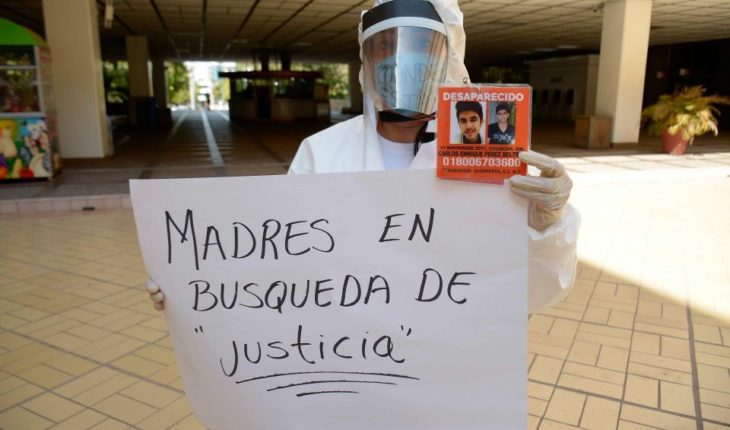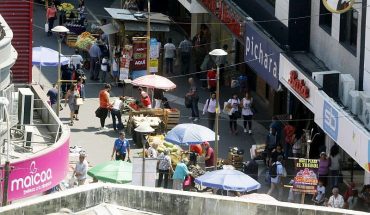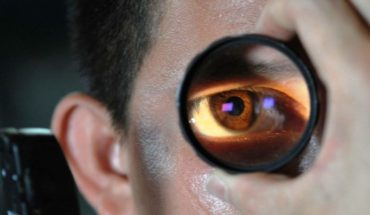In order to use most of their time in the search for their children in forensic centers and clandestine graves, people who make up groups of relatives of the disappeared must be kept in informal work, and due to the coVID-19 contingency many of them are unemployed.
Therefore, with support from the El Día After initiative, collectives carry out the fundraising campaign, food and medicines #YoApoyoParaEncontrarles, for the benefit of relatives of missing persons in different states of the country.
Relatives of missing persons need your help. Hand them away by donating food or medicine. #MiBarrioMeRespalda ?? pic.twitter.com/n1sK1R3dM3
— The Day After (@eldiadespuesmx) April 26, 2020
“Families no longer live, they survive”
Yahaira Guadalupe Baena López disappeared on April 13, 2011 in Oaxaca, where she moved with her husband, a special forces soldier who was transferred to this state from Sinaloa, from where the young woman was originally from.
Following her disappearance, her mother, Margarita López, spent her time finding Yahaira’s whereabouts, which led her to become a human rights defender, along with other mothers searching for their missing children in the collective Searching For Bodies.
Two years, 4 months and 19 days after her daughter disappeared, Margarita was given the body that, the authorities and a group of Argentine forensic experts, was from Yahaira.
Read: #CorazonesEnMarcha: Summon digital mobilization on May 10 for missing
“When my daughter happened, I was a business mom, until she disappeared and I had to focus fully on her quest. I had to get rid of a lot of heritage, and now with my three children we survive with how little we can do,” he says.
Although Margarita found her daughter, she remains dedicated to the search for missing persons, in support of families who do not have the resources or conditions to do this work.
“As I was looking for my daughter, I realized there were bodies I was recovering, and I was asking God to go back to their moms. Then I gave myself the task of all those remains being given to their families,” he says in an interview with Animal Politician.
According to Margarita, support from state governments and the federal government has always been scarce, so since before the COVID-19 contingency they support some families with funeral expenses after recovering the body of their relatives, mainly in states like Guerrero, Michoacán and Tamaulipas.
However, in the face of the contingency many families are vulnerable, because they cannot go out to work on the street, most of them are merchants and have had to stop having economic income due to confinement,
For this reason, he explains, they have seen the need to gather resources to make pantries, bring cover and antibacterial gel to some of the families that make up the collective.
“It’s vital for them to keep surviving, because they no longer live, they survive,” he says.
In order to continue to support these people with pantries and medicines for those with diseases, they collect in Mexico City.
Read: Continue to track or postpone the search: the disjunction of families of the missing before COVID-19
All to join #YoApoyoParaEncontrarles in @eldiadespuesmx #MIbarrioMeRespalda seeks the collective postcard @buscandocuerpos; there you will find the donating account or the phone to deliver in-kind supports pantries, medicines, braces, hygiene products pic.twitter.com/6LMwBABzFF
— Elitos (@elauva) May 5, 2020
“There’s no money to reach”
Alma Rosa Preciado has been searching for his daughter Ilse Janet Cervantes, his granddaughter Renata Janet Leal Cervantes, his son-in-law José Adalberto Leal Uribe and a cousin of his son, Ernesto Angulo Lugo, since August 2011. The four disappeared in Córdova, Veracruz, while traveling to Chiapas, from Sinaloa, from where they originate.
Since then, he had to devote himself to informal jobs to have enough time to make the search for his relatives his main activity, “and because because of the contingency we are left without jobs, and the saddest thing that happens to us is that we can not even go out looking”.
For two years, Alma has been a member of the United collective for the love of our missing, together with 23 families from the states of Querétaro, Puebla, Veracruz and Sinaloa.
Everyone says, the pandemic is “hitting them emotionally, because we can’t go out looking for our children, and how little the authorities usually do to find them, nothing is being done. Everything was paralyzed.”
He also says, although the government supports them, “there is no money to reach, that’s why we’re asking for financial support. We ask society to be sensitive to the problem we are having and to stand in solidarity with the collective.”
The United Collective for Love of Our Disappeared needs your support in order to cope with this contingency by Covid19. Stand up ? #YoApoyoParaEncontrarles pic.twitter.com/J65GkROrv2
— The Day After (@eldiadespuesmx) April 30, 2020
“Disappearances did not go into quarantine”
Diana, a member of the collective Looking for You with Love, says that many of the members were out of work because of the COVID-19 crisis, so there are families affected.
“Some have to pay rent and there are companions who are sick and don’t have for their medication for conditions like hypertension, anxiety and even cancer,” she says.
Some have relatives with COVID-19 and are in a crisis not only economic, because of the deficiencies they have to survive and that “unfortunately the disappearances did not become quarantined”.
Since her mother was kidnapped, in September 2016, Diana joined Looking for You with Love, and until now she has not heard of her whereabouts, although she has not stopped looking for her with her own means.
To support families with missing loved ones in the State of Mexico, the collective is requesting financial support, products from the basic basket to distribute among families and psychological help, as many of the people are having difficult times of frustration.
“We call on people to stand in solidarity with us. Everybody’s having a hard time, but there are people who are having a lot worse time. It’s very difficult to have a missing family member and cope with the pandemic, confinement and frustration to the soul and heart.”
The collective @buscandoteconam need your solidarity in this contingency by Covid19. If you are from the STATE OF MEXICO, help them with food, pantries or economically. ??#YoApoyoParaEncontrarles pic.twitter.com/Y1ZYBBLADL
— The Day After (@eldiadespuesmx) May 5, 2020
“We have to get ahead out of love for our children”
The six families that make up the collective Con fe I look for you, in Tamaulipas, have a need for pantries because they lost their jobs because of the pandemic and have to pay rent, in addition to the that, as heads of households, many of their members must support their children and grandchildren.
Maria, the mother of a young man who was disappeared 9 years ago in Ciudad Victoria, is one of them.
“I don’t work, because Either I work or I’m looking for my son. I usually do to fix clothes, but right now the situation is very difficult,” he regrets.
She, like other members of the collective, are people living with diseases such as diabetes, asthma and hypertension, however, she says that they are clear that “we have to get ahead because of the love that we have for our children.”
For this reason, they are asking for food to be distributed among the six families, residents of Ciudad Victoria, Tamaulipas.
In this contingency, we support relatives of missing persons. The Collective With faith I look for you and with love I wait for you, ask for help with food and toiletries, give them your hand. #YoApoyoParaEncontrarles ? pic.twitter.com/u9336NphlG
— The Day After (@eldiadespuesmx) April 30, 2020
Computers to connect families
In addition to the food and financial support requested by families, they are in search of computer donations, the same that they need to be able to continue in communication or psychological and legal advice, or to send trades to the government offices that serve their cases.
Jérémy Renaux, deputy director of the civil association IDHEAS, explains that the need for families to have computer equipment predates the pandemic, however at this particular time they require it not to stop their search actions.
“The idea is to receive computers and also printers, all that is stationery so that the groups can work despite quarantine, that they can continue their work from home and do not be frustrated by being locked up,” he says.
Those who wish to donate a computer can contact J. or contact IDHEAS directly, who can receive the equipment or provide information so that donors can directly send the supports to groups in their state.
Having a computer will allow you for example:
– Write trades for the authorities for the monitoring of their cases;
– Conduct online research and compile reports;
– Take courses and online talks;
– Make updates to your social networks.
— Jérémy Renaux (@jeremy_renaux) May 6, 2020
For all calls for groups of relatives of missing persons see the page of El Día After.
What we do in Animal Político requires professional journalists, teamwork, dialogue with readers and something very important: independence. You can help us keep going. Be part of the team.
Subscribe to Animal Político, receive benefits and support free journalism #YoSoyAnimal.





